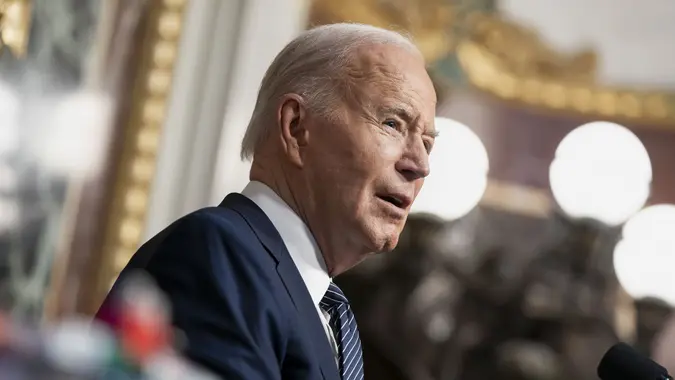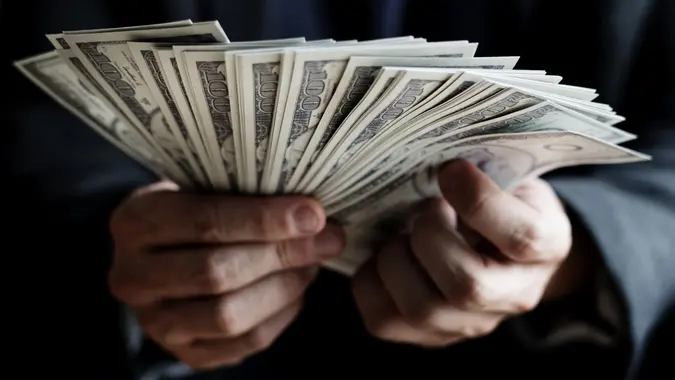I’m an Economist: Here Are My Predictions for the Used Car Market If Trump Wins

Commitment to Our Readers
GOBankingRates' editorial team is committed to bringing you unbiased reviews and information. We use data-driven methodologies to evaluate financial products and services - our reviews and ratings are not influenced by advertisers. You can read more about our editorial guidelines and our products and services review methodology.

20 Years
Helping You Live Richer

Reviewed
by Experts

Trusted by
Millions of Readers
After the first presidential debate this summer, America has questions. Can former President Donald Trump retake the White House? Can President Joe Biden regain a second term? Can either stem inflation and the rising cost of living?
But other questions extend further out into the economy. Focusing on a specific market, like used cars, what does the outcome of the election have in store for that demographic of business?
GOBankingRates spoke to some economists to get their estimations and predictions for the used car market if Trump wins the election, including various seismic shifts influenced by his economic policies and broader market reactions.
Also see retirement moves you should consider if Trump is elected.
Market Uncertainty and Volatility
The prospect of policy shifts under a Trump administration rattles the markets, for better or worse. With an uncertain economy, consumer confidence starts to waiver. Spending behaviors change as families try to scrimp and save any penny they have.
“While politics always affect economic conditions, there are several reasons why the secondhand automobile industry is particularly sensitive towards changes in regulations, consumer sentiment and general economic policies,” said Chuck Warren, host of the economic podcast “Breaking Battlegrounds.”
The first wave of market volatility could produce a timid consumer base, with many people putting off big buys like cars while they wait for the economic fallout to be cleaned up with new administrative policies.
Abid Salahi, the co-founder of FinlyWealth, added: “A Trump victory in the 2024 election could significantly disrupt the used car market, potentially leading to a price surge and tightening supply. This scenario is predicated on Trump’s historical stance on trade policies and their ripple effects on the automotive industry.”
Trade Policies and Tariffs
Trump’s trade policies were not stellar during his first term in office. China and America experienced turbulent times under the last administration. When it comes to tariffs on imported goods, the availability of car parts and the cost to import them, as well as foreign-produced vehicles, might be impacted.
“During his previous term, Trump’s administration imposed tariffs on imported vehicles and parts, increasing costs for new cars,” Salahi recalled. “This trend could continue or even intensify in a second Trump term. As new car prices rise, demand for used vehicles typically increases as consumers seek more affordable options. This shift in demand could drive up used car prices dramatically.”
Warren added, “Fiscal policies linked to manufacturing, trade agreements or even consumer spending patterns can be changed if Donald Trump returns to power — and this could consequently impact significantly on the sector.”
As an example, Salahi said, “When the Trump administration initially imposed tariffs on steel and aluminum in 2018, it led to a 3% increase in new car prices within the first year. This seemingly small increase had a significant knock-on effect on the used car market, with prices rising by an average of 2.5% in the same period.”
Say tariffs for imported cars or automotive parts do come back under a second Trump term, only this time they are increased. It could lead to higher prices for used cars. If those used cars happen to not be domestically made, expect higher mechanic bills when it comes time for repair and maintenance.
“Nonetheless, the state of international trade relations, interrupted supply chains and changing customer tastes are important in shaping market situations,” Warren said. “Such intricacies necessitate an examination of both local and global economic landscapes in order to predict with accuracy what the future holds for the pre-owned car market post-2024 election.”
The Chance for Economic Growth via Deregulation
Trump and his administration will, in all probability, look to deregulate a variety of business sectors — with the automotive industry nearly at the top of the list.
Without regulatory oversight, car manufacturers and dealerships could find themselves with lower operational costs. This might give way to an increase in the supply of used cars due to the new car market starting to look more and more appealing. Prices of used cars might even stabilize or drop in this scenario.
Consumer Spending and Tax Policies
Reducing corporate and personal taxes might sound appealing to a certain upper echelon, which is why Trump’s tax policies look very attractive to the wealthy.
“Traditionally, Republican governments have been associated with deregulation-oriented policies, possibly lower corporate taxes, which can encourage business investments and affect customer buying power,” Warren explained. “These features might thus lift the car industry, particularly covering the used car market based on the expectations of participants as well as their reactions thereto.”
However, a change in policy around taxes might increase disposable income for consumers, in addition to helping businesses’ profitability. One potential outcome this could lead to is consumers and businesses feeling more secure in financial standing, upping the demand for both new and used cars.
Investments Toward Infrastructure
Both Biden and Trump have touted the need to invest in the infrastructure of America. Were Trump to utilize a substantial investment toward the national infrastructure, a demand for more vehicles might go up.
This is because new projects require logistical support to complete, including more transportation, and thus the need for cars on the road. While the new car market might still be out of range for many Americans, the used car market could start looking very enticing.
However, Salahi pointed out: “If Trump pursues policies that restrict immigration or limit international trade agreements, it could lead to labor shortages in the automotive industry and disrupt supply chains. This would likely result in decreased production of new vehicles, further tightening the supply of used cars and driving up prices.
“It’s crucial to note that these predictions are based on historical data and current market conditions,” Salahi said. “The impact could vary depending on the policies implemented and broader economic factors at play.”
Warren summed up the matter by saying, “While elections’ outcomes might introduce volatility and uncertainties, considering it in conjunction with economic fundamentals as well as policy implications can be helpful to determine what is possible for the used car market under a reelected Trump presidency.”
More From GOBankingRates
- 9 Things You Must Buy at Big Lots While on a Retirement Budget
- I'm a Mechanic: These 4 Cars Have Engines That Could Die on You
- 3 Things to Do This Week If You Have Debt
- 3 Things You Must Do When Your Savings Reach $50,000
 Written by
Written by  Edited by
Edited by 



























